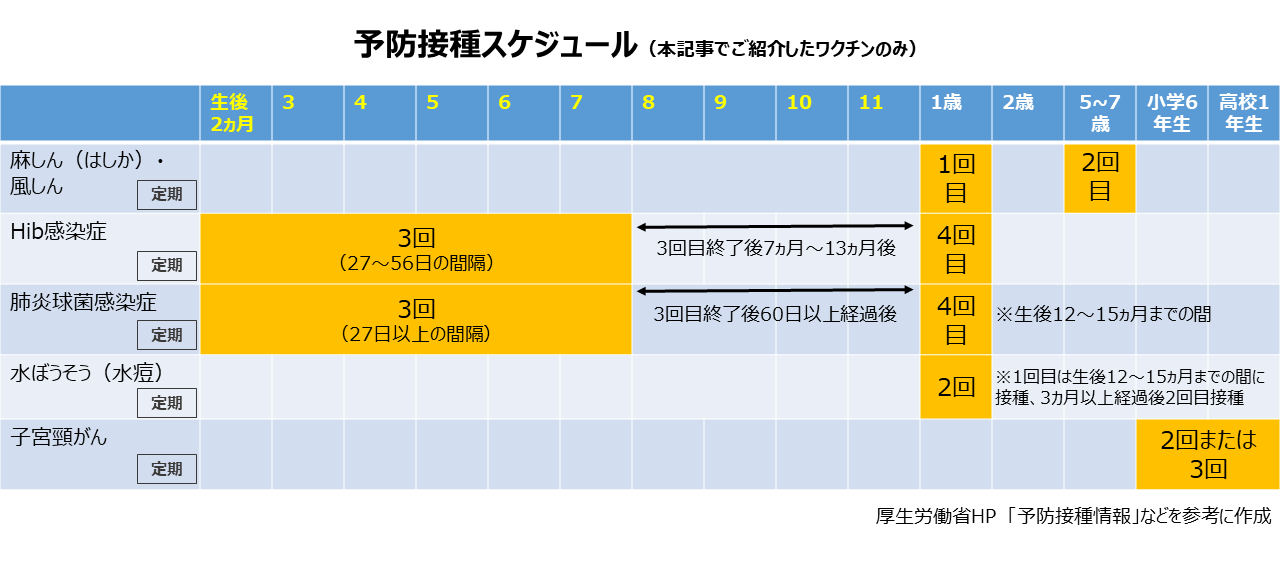
Release date: 2023.08.29
Vaccine-preventable diseases such as rubella and measles are called VPD (Vaccine Preventable Diseases). Immunizations are important to protect children's health. The VPD vaccine should be given at the recommended timing. We will focus on VPD in children and summarize the effects of vaccines on them.
Immunizations include routine and optional vaccinations. Routine inoculation is inoculation that country performs free. Voluntary inoculations are inoculations for which the government does not bear the cost, but in many cases public funds are subsidized. There are various diseases of VPD, but this time, we will list the ones that are considered to be particularly important, and introduce the effects of vaccines against them and the recommended vaccination schedule.
Rubella is an infectious disease that causes symptoms such as fever, rash, and swollen lymph nodes. The disease has a particularly serious impact on pregnant women and can lead to complications such as fetal development abnormalities, heart disease, and sensorineural hearing loss. Measles is highly contagious and causes symptoms such as high fever, rash, cough and conjunctivitis. Complications include pneumonia and encephalitis, which can lead to serious disability and death. The MR vaccine is said to have an immunity acquisition rate of 95% for rubella and measles with one dose, and about 99% with two doses, so two doses are more effective.
Recommended vaccination schedule:
1st dose at 1 year old, 2nd dose before entering elementary school (5-7 years old)
Hib infection is caused by Haemophilus influenzae type b and primarily affects infants. It can cause serious complications such as meningitis and pneumonia. Hib vaccination can reduce the risk of serious Hib infection by more than 95%.
Recommended vaccination schedule:
The first vaccination is started after 2 months of age (up to 7 months of age), followed by 3 doses at intervals of 27 to 56 days, and the booster dose is given 7 to 13 months after the 3rd dose of the first dose. 1 dose
Pneumococcal infections are diseases that cause pneumonia, otitis media, and sepsis. It can lead to serious complications, especially in infants. Pneumococcal vaccination has been reported to reduce the risk of serious pneumococcal infection by more than 95%.
Recommended vaccination schedule:
The first dose is given between 2 months and 7 months of age, followed by 3 doses at intervals of 27 days or more, and the booster dose is administered between 12 months and 15 months of age, 60 days after the 3rd dose of the first dose. 1 dose at intervals of more than
Chickenpox (chickenpox) is an infectious disease that causes symptoms such as a rash, fever, and itching. Once infected, there is a risk of developing a disease called herpes zoster later. A single dose of the chickenpox vaccine is thought to prevent almost 100% of severe chickenpox, and two doses of the vaccine are thought to prevent the onset of the disease, including mild chickenpox.
Recommended vaccination schedule:
The first dose is given between 12 and 15 months of age, and the second dose is given at least 3 months after the first dose.
Cervical cancer, a cancer caused by human papillomavirus (HPV) infection, is a serious disease for women. HPV vaccines are effective against specific HPV types, and bivalent and quadrivalent vaccines can prevent infection with HPV types 16 and 18, the types that cause cervical cancer. Prevents 50-70% of The 9-valent vaccine prevents 80-90% of the causes of cervical cancer because it protects against HPV types 16 and 18 plus five other HPV types.
Recommended vaccination schedule:
Girls from the 6th grade of elementary school to the 1st grade of high school are eligible for routine vaccination, and receive a total of 2 or 3 doses of the same vaccine.
Both vaccines are administered at a fixed number of times between six months and one year. The VPD vaccine should be given at the recommended timing.
Voluntary vaccines include mumps vaccine, triple vaccine, and influenza vaccine. Every year, many children are infected with VPD, which should be preventable with vaccines, and suffer severe aftereffects or even lose their lives. I want to prevent the vaccine properly and protect the lives of children.

MEDIUS Group is developing a business centered on the sale of medical equipment. We (Medical + us) involved in medical care also want to play the role of an information source (Media) that delivers useful information for the medical field and people's healthy tomorrow.